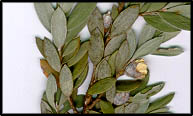South West Slopes Revegetation Guide
Leptospermum grandifolium
Mountain Tea-tree
Select from the following for detailed images.
Species Information
| Synonyms |
|
| Common Names |
Mountain Tea-tree, Woolly Tea-tree |
| Family |
Myrtaceae - Myrtle family. |
| Name Origin |
Leptospermum - from Greek leptos, slender, and sperma, seed, referring to narrow seeds of some species. grandifolium - from Latin grandis, large and folium, foliage, referring to large leaves. |
Specimen Data - CSU 2178
| Location |
Bogong High Plains, Alpine National Park, east side Basalt Hill, approximately 500m from Langford's Gap carpark along aqueduct walking track, west side of track. Lat. 36 53' 35''S Long. 147 19' 17''. Vic. |
| Notes |
|
| Collector |
Burns, A. |
Date |
26/01/1999 |
| Determined By |
McLoughlin, S. |
Date |
01/12/1997 |
South West Slopes Revegetation Guide Information
| Regional: |
Noted in the upper Murray areas: Rosewood Plateau; Paddy's River-Burra Valley; Maragle; Tooma; Ardenside-Welaregang; Lower Tooma-Greg Greg and Bringenbrong-Khancoban. |
| Australia: |
NSW, Vic, Tas. |
| Habitat: |
Sandy swamps and rocky streambanks. |
| Habit: |
Large, fairly dense shrub to small rounded tree 1.5 m to over 6 m high. Leaves mostly 1-3 cm long. |
| Similar Species: |
|
| Site Preference: |
|
| Characteristics: |
|
| Flowering: |
White, Oct-Jan. |
| Seed Collection: |
Any time. Seeds retained for many years, and shed after adversity such as injury, drought or fire. Collect capsules from older wood. Seeds highly viable, remaining so for many years in storage. |
| Propagation: |
From seed or cuttings, which strike readily. Sow light scattering of seed and cover lightly. Germinates in 2-5 |
| Regeneration: |
From seed. |
| Timber: |
Used for turning. |
| Shade and Shelter: |
Useful low-level cover in windbreaks. |
| Land Protection: |
Useful in controlling streambank and gully erosion due to soil-binding fibrous roots. |
| Wildlife: |
Excellent habitat. Prickly foliage excellent refuge for small birds, particularly dense thickets. Flowers are a good pollen and nectar source for many native insects, including moths and butterflies. Insect-eating birds attracted. |
| Ornamental: |
Attractive. Prune to promote bushiness. |
| Other: |
Used in colonial medicine. |
Note: The following information presented is only a guide, as plant characteristics vary depending on provenance (the plant's locality).
| Site/Preferred Habitat : |
swamps & creekbanks at higher altitudes |
| Rainfall(mm) : |
750+ |
| Growth Rate : |
moderate/fast |
| Tolerates : |
moderate frost |
| Resents : |
|
| Uses & Comments : |
windbreak; erosion control; wood turning; wildlife; ornamental |
Return to Database List
